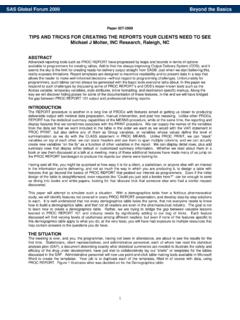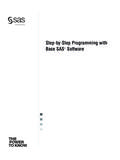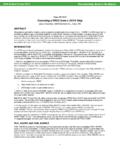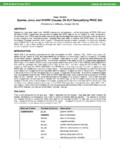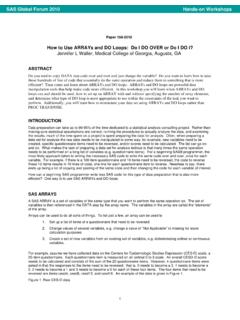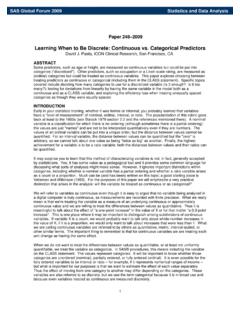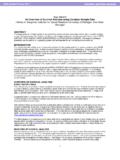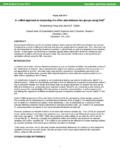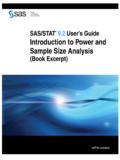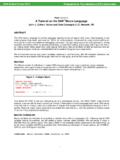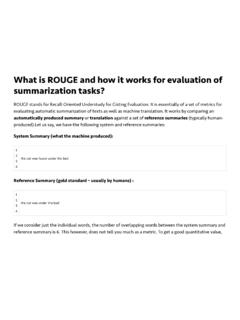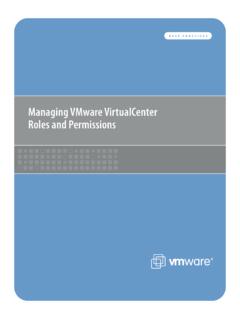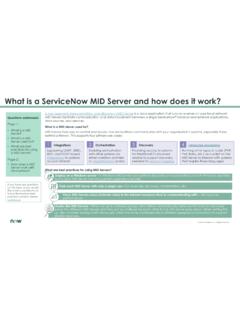Transcription of Perl Regular Expressions Tip Sheet - SAS Support
1 perl Regular Expressions Tip Sheet Functions and Call Routines regex-id = prxparse( perl -regex) Compile perl Regular expression perl -regex and return regex-id to be used by other PRX functions. pos = prxmatch(regex-id | perl -regex, source) Search in source and return position of match or zero if no match is found. new-string = prxchange(regex-id | perl -regex, times, old-string) Search and replace times number of times in old-string and return modified string in new-string. call prxchange(regex-id, times, old-string, new-string, res-length, trunc-value, num-of-changes) Same as prior example and place length of result in res-length, if result is too long to fit into new-string, trunc-value is set to 1, and the number of changes is placed in num-of-changes. text = prxposn(regex-id, n, source) After a call to prxmatch or prxchange, prxposn return the text of capture buffer n.
2 Call prxposn(regex-id, n, pos, len) After a call to prxmatch or prxchange, call prxposn sets pos and len to the position and length of capture buffer n. call prxnext(regex-id, start, stop, source, pos, len) Search in source between positions start and stop. Set pos and len to the position and length of the match. Also set start to pos+len+1 so another search can easily begin where this one left off. call prxdebug(on-off) Pass 1 to enable debug output to the SAS Log. Pass 0 to disable debug output to the SAS Log. call prxfree(regex-id) Free memory for a regex-id returned by Syntax Character Behavior /../ Starting and ending regex delimiters | Alternation () Grouping Wildcards/Character Class Shorthands Character Behavior . Match any one character \w Match a word character (alphanumeric plus "_") \W Match a non-word character \s Match a whitespace character \S Match a non-whitespace character \d Match a digit character \D Match a non-digit character Character Classes Character Behavior [.]
3 ] Match a character in the brackets [^..] Match a character not in the brackets [a-z] Match a character in the range a to z Position Matching Character Behavior ^ Match beginning of line $ Match end of line \b Match word boundary \B Match non-word boundary Repetition Factors (greedy, match as many times as possible) Character Behavior * Match 0 or more times + Match 1 or more times ? Match 1 or 0 times {n} Match exactly n times {n,} Match at least n times {n,m} Match at least n but not more than m times Advanced Syntax Character Behavior non-meta character Match character {}[]()^$.|*+?\ Metacharacters, to match these characters, override (escape) with \ \ Override (escape) next metacharacter \n Match capture buffer n (?:..) Non-capturing group Lazy Repetition Factors (match minimum number of times possible) Character Behavior *?
4 Match 0 or more times +? Match 1 or more times ?? Match 0 or 1 time {n}? Match exactly n times {n,}? Match at least n times {n,m}? Match at least n but not more than m times Look-Ahead and Look-Behind Character Behavior (?=..) Zero-width positive look-ahead assertion. regex1(?=regex2), a match is found if both regex1 and regex2 match. regex2 is not included in the final match. (?!..) Zero-width negative look-ahead assertion. regex1(?!regex2), a match is found if regex1 matches and regex2 does not match. regex2 is not included in the final match. (?<=..) Zero-width positive look-behind assertion. (?<=regex1)regex2, a match is found if both regex1 and regex2 match. regex1 is not included in the final match. (?<!..) Zero-width negative look-behind assertion. perl Regular Expressions Tip Sheet Basic example data _null_; pos=prxmatch('/world/', 'Hello world!)
5 '); put pos=; txt=prxchange('s/world/planet/', -1, 'Hello world!'); put txt=; run; Output: pos=7 txt=Hello planet! Data Validation data phone_numbers; length first last phone $ 16; input first last phone datalines; Thomas Archer (919)319-1677 Lucy Barr 800-899- 2164 Tom Joad (508) 852-2146 Laurie Gil (252)152-7583 ; data invalid; set phone_numbers; where not prxmatch("/\([2- 9]\ d\d\) ?" || "[2-9]\ d\d-\d\d\d\d/",phone); run; proc sql; /* Same as prior data step */ create table invalid as select * from phone_numbers where not prxmatch("/\([2- 9]\ d\d\) ?" || "[2-9]\ d\d-\d\d\d\d/",phone); quit; Output: Obs first last phone 1 Lucy Barr 800-899- 2164 2 Laurie Gil (252)152-7583 Search and Replace #1 data _null_; input; _infile_ = prxchange('s/</</', -1, _infile_); put _infile_; datalines; x + y < 15 x < 10 < y y < 11 ; Output: x + y < 15 x < 10 < y y < 11 Search and Replace #2 data reversed_names; input name datalines; Jones, Fred Kavich, Kate Turley, Ron Dulix, Yolanda ; data names; set reversed_names; name = prxchange('s/(\w+), (\w+)/$2 $1/', -1, name); run; proc sql; /* Same as prior data step */ create table names as select prxchange('s/(\w+), (\w+)/$2 $1/', -1, name) as name from reversed_names; quit.
6 Output: Obs name 1 Fred Jones 2 Kate Kavich 3 Ron Turley 4 Yolanda Dulix Search and Extract data _null_; length first last phone $ 16; retain re; if _N_ = 1 then do; re = prxparse("/\(([2-9]\ d\d)\ ) ?" || "[2-9]\ d\d-\d\d\d\d/"); end; input first last phone if prxmatch(re, phone) then do; area_code = prxposn(re, 1, phone); if area_code ^in ("828" "336" "704" "910" "919" "252") then putlog "NOTE: Not in NC: " first last phone; end; datalines; Thomas Archer (919)319-1677 Lucy Barr (800)899-2164 Tom Joad (508) 852-2146 Laurie Gil (252)352-7583 ; Output: NOTE: Not in NC, Lucy Barr (800)899-2164 NOTE: Not in NC, Tom Joad (508) 852-2146 For complete information refer to the Base SAS documentation at
